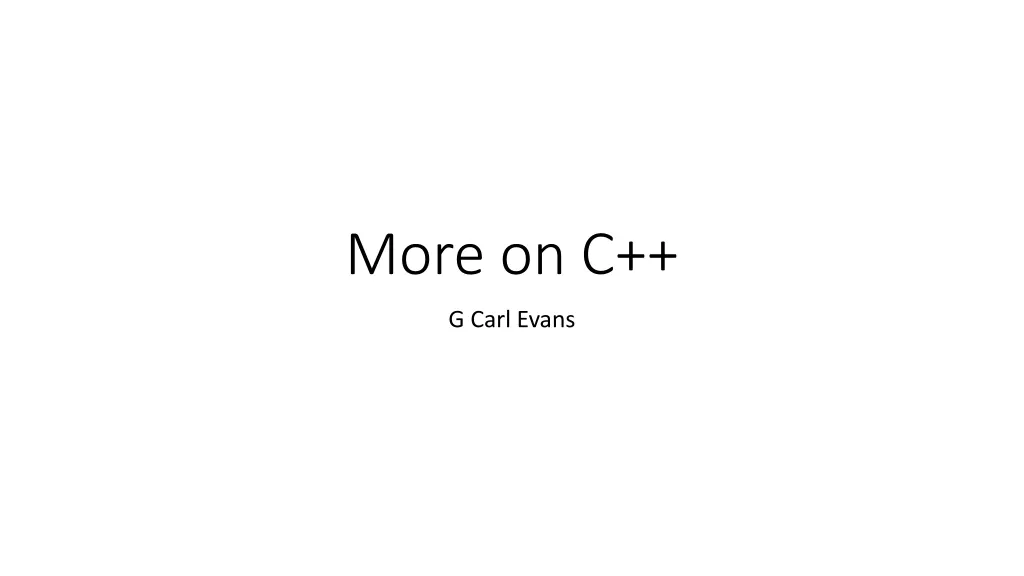
Advanced C++ Programming Concepts
Explore operator overloading, pointer manipulation, stream extraction, and dynamic allocation in C++ to enhance code readability and control behavior. Learn about the behavior of pointers and explicit dynamic allocation for efficient memory management.
Download Presentation

Please find below an Image/Link to download the presentation.
The content on the website is provided AS IS for your information and personal use only. It may not be sold, licensed, or shared on other websites without obtaining consent from the author. If you encounter any issues during the download, it is possible that the publisher has removed the file from their server.
You are allowed to download the files provided on this website for personal or commercial use, subject to the condition that they are used lawfully. All files are the property of their respective owners.
The content on the website is provided AS IS for your information and personal use only. It may not be sold, licensed, or shared on other websites without obtaining consent from the author.
E N D
Presentation Transcript
More on C++ G Carl Evans
Operator Overloading Make code more readable and intuitive by allowing more natural expression Change the behavior of many of the standard operators based on the types that are being used. We have seen the overload of [] with map and vector We have seen the overload of -> and * with the iterator in map
Operators that can be overloaded in C++ Operator Category Operators Arithmetic Bitwise Relational Logical Assignment + - * / % ++ -- & | ^ ~ >> << < <= > >= == != ! && || = += -= *= /= %= = &= |= >>= <<= <= >= () [] -> , -> Other
Stream extraction and insertion std::ostream& operator<<(std::ostream& os, const T& obj){ // write obj to stream return os; } std::istream& operator>>(std::istream& is, T& obj){ // read obj from stream if( /* T could not be constructed */ ) is.setstate(std::ios::failbit); return is; }
Pointers (Dereference Operator *, Address of Operator &) Pointers are just variables Store addresses Declare in C++ as follows int *ptr_x; How do I set a pointer ptr_x = ptr_y; ptr_x = &x; How do I access what a pointer points to? *ptr_x = 42; cout << *ptr_x;
What is the behavior? What probably happens? A. 10 printed B. Some address printed C. Some unknown value printed D. Segfault and crash int *ptr; int val; ptr = &val; *ptr = 10; cout << val;
Explicit Dynamic Allocation new allocates memory and constructs objects returning the address int *heap_int = new int; Can allocator arrays int *heap_array = new int[10] delete Releases memory allocated with new delete heap_int; Must specify when releasing arrays delete[] heap_array;
What is the behavior? What probably happens? A. 10 printed B. Some address printed C. Some unknown value printed D. Segfault and crash int *heap_x; int *heap_y; heap_x = new int; heap_y = heap_x; *heap_y = 10; cout << *heap_x;
What is the behavior? What probably happens? A. 10 printed B. Some address printed C. Some unknown value printed D. Segfault and crash int *heap_x; int *heap_y; heap_y = heap_x; heap_y = new int; *heap_y = 10; cout << *heap_x;
Passing Arguments By value Make a copy By reference Like Java objects By pointer Pass a copy of the pointer
What happens? What probably happens? A. 10 printed B. 200 printed C. Won't compile D. Some unknown value printed E. Segfault and crash void fn(int x) { x = 10; } int main() { int x = 200; fn(x); cout << x; }
What happens? What probably happens? A. 10 printed B. 200 printed C. Won't compile D. Some unknown value printed E. Segfault and crash void fn(int &x) { x = 10; } int main() { int x = 200; fn(x); cout << x; }
What happens? What probably happens? A. 10 printed B. 200 printed C. Won't compile D. Some unknown value printed E. Segfault and crash void fn(int *x) { x = 10; } int main() { int x = 200; fn(x); cout << x; }
What happens? What probably happens? A. 10 printed B. 200 printed C. Won't compile D. Some unknown value printed E. Segfault and crash void fn(int *x) { x = 10; } int main() { int x = 200; fn(&x); cout << x; }
